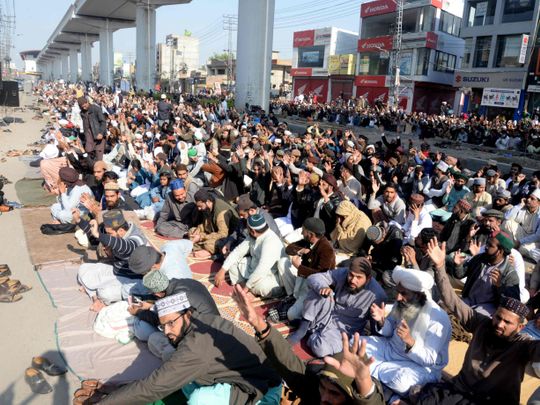
Lahore: Tens of thousands of maskless mourners gathered in Lahore on Saturday for the funeral of hardline Pakistani cleric Khadim Hussain Rizvi, who for years terrorised the country’s religious minorities, incited riots and advocated the destruction of European nations.
Vast crowds of men were seen thronging the centre of the eastern city ahead of Rizvi’s funeral, chanting in unison and for the most part flouting mask-wearing rules even with the country on the cusp of a second wave of the coronavirus outbreak.
No cause of death has been announced for the 54-year-old Rizvi, who died Thursday after suffering a high fever and difficulties breathing, and no COVID-19 test or autopsy were conducted on the long-time wheelchair user.
While Pakistan has dodged the worst of the coronavirus pandemic so far, case numbers have been rising sharply in recent weeks.
In life, Rizvi acted as a lightning rod for Pakistan’s religious right, and was adept at stirring sectarian resentments and mobilising thousands of fanatical supporters at a moment’s notice.
His death came just days after he led a paralysing anti-France rally in Islamabad, threatening to repeat a 2017 blockade that crippled the capital.
His Tehreek-e-Labbaik Pakistan party (TLP) held a three-day anti-France rally that ended after he claimed to have forced the government to agree to kick out the French ambassador.
Whether the TLP can hold its momentum without the charismatic Rizvi is unclear.
“The TLP already has an extensive support base. His lifeline was his narrative and his narrative was still intact,” security analyst Amir Rana told AFP.
“The TLP will remain on Pakistan’s security and political landscape for a longer time and leadership may not be a big factor.”
However, columnist Zahid Hussain chalked up the TLP’s victories over the years to government weakness rather than its actual strength as a political force.
“I don’t think anybody could provide the type of a leadership he had,” he said.
“It was more of a personal following than an ideological movement.”
The TLP first coalesced as a movement demanding the release of Mumtaz Qadri - a bodyguard who gunned down Punjab governor Salman Taseer in Islamabad in 2011.
Qadri later cited Taseer’s demands to reform blasphemy laws as his motive and was hanged in 2016 - sparking massive protests and an outpouring of emotion during his public funeral in Lahore that set the stage for future TLP demonstrations.








